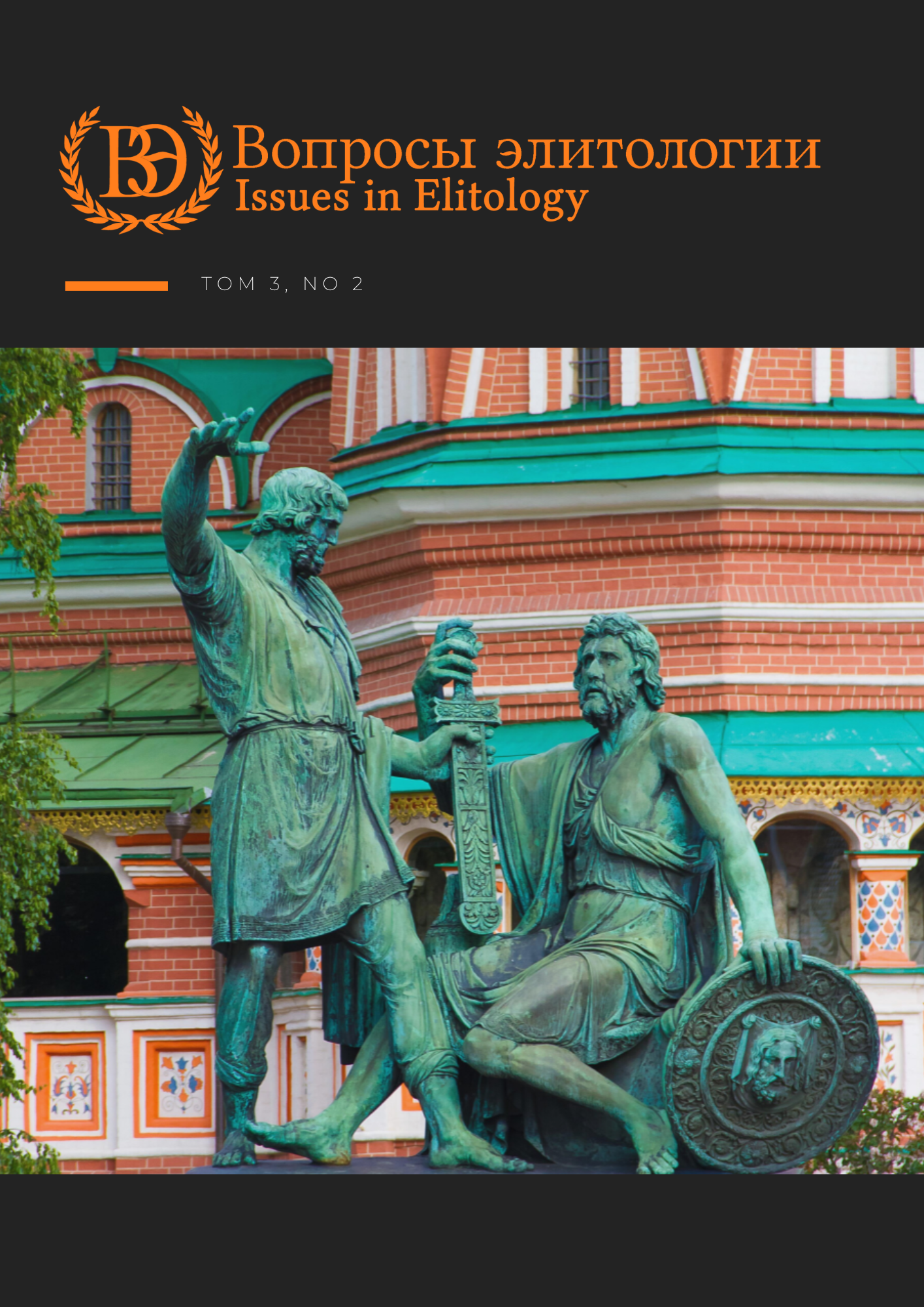Аннотация
Современные политические элиты переживают весьма драматические изменения, связанные с трансформацией их традиционных кодов поведения, которые были отработаны в эпоху развитого индустриального общества. Однако участившиеся кризисы (2008 и 2022 гг.) свидетельствуют о том, что мир элит встал перед серьезным выбором – проверенные методы профессиональной деятельности уже не работают, а кадровой компетенции оказывается недостаточно для того, чтобы объективно оценивать и принимать адекватные решения. Кризис уже коснулся таких фундаментальных основ миропорядка, как демократические институты и национальная безопасность. Сбой функционирования в этих сферах чреват серьезными репутационными и социально-политическими потерями. К этому добавился еще конфликт ценностей и смыслов. В результате во властных структурах стала меняться мотивация их поведения, а в селекции элит наметился не просто очевидный застой, а самый настоящий кадровый кризис, грозящий потерей основных профессиональных компетенций. Однако, рост угрозы мирового системного кризиса не ощущается правящими элитами, которые ничего не делают для его предотвращения и продолжают вести обычную докризисную политику. Игнорировать таким образом объективную реальность дальше у них не получится. Рано или поздно наступит «момент истины», когда им придется взглянуть правде в глаза. Настоящая работа посвящена анализу указанной проблематики.
Литература
Altawil F.A. (2017). Transformation of Political Regimes in Egypt and Libya in the «Arab Spring»: A Comparative Analysis (Issue 1). Politics, Economics, Law. (In Russian).
Amurov M.A. (2020). Typology of modern political elites. Management Consulting, 5 (137). doi: 10.22394/1726-1139-2020-5-19-28 (In Russian).
Arceneaux K., Dunaway J., & Soroka S. (2018). Elites are people, too: The effects of threat sensitivity on policymakers’ spending priorities. PloS One, 13(4). doi: 10.1371/journal.pone.0193781
Bahardoost P., Tavassoli Roknabadi M., & Erfanmanesh M. (2019). The Role of Political Elite Relations in the Elites Circulation. IAU Interna-Tional Journal of Social Sciences, 9(2).
Best, H. (2010). Democratic Elitism: New Theoretical and Comparative Perspectives (J. Higley, Ред.; 3rd pub.). Brill.
Boyko S.I. (2018). Political ambivalence of elites as the capital of revolution. Humanities. Vestnik finansovogo universiteta, 2(32). doi: 10.26794/2226-7867-2018-8-2-31-36 (In Russian)
Dahl, R. A. (1956). Preface to Democratic Theory. University of Chicago Press.
Duca A.V. (2015). Fundamentals of power elites functioning. Power and Elites. (In Russian).
Gaman-Golutvina, O. (2018). Political Elites in the USA under George W. Bush and Barack Obama: Structure and International Politics (V. 43, Issue 4). Historical Social Research/ Historische Sozial for schung. doi: 10.12759/hsr.43.2018.4.141-163
Gewirtz, J. (2020). China Thinks America is Losing. - Foreign Af-Fairs, 99(6), 62–72.
Gorskaya A.N. (2018). Basic approaches to the study of elites and the possibilities of their application to the analysis of the local level of power and governance-Contentus (Issue 5 (70)). (In Russian).
Grigoryan D.K., Kritskaya A.A., Ayrapetyan D.A., & Verenich I.G. (2020). Ruling elite of foreign countries and its role in geopolitical communications of modernity. Communicology. doi: 10.21453/2311-3065-2020-8-1-63-73 (In Russian).
Higley, J. (2006). Elite Foundations of Liberal Democracy (edition): Rowman& Littlefield.
Higley, J. (2018). Continuities and discontinuities in elite theory—The Palgrave Handbook of political elites. Palgrave Macmillan. doi: 10.1057/978-1-137-51904-7_4
Komkova S.S. (2018). Political elites in Central Asian states: Common features and radical differences. Archont, 2 (5). (In Russian).
Kozhemyak N.S. (2018). The policy of H. Assad’s government towards the Druze community in Syria: Political and ideological aspects (Issue 4 (38)). Bulletin of the Belarusian State University. (In Russian).
Lanko D.A. (2012). Geopolitics of Eurasia in the representation of political elites. Eurasian Integration: Economics, Law, Politics, 11. (In Russian).
Maximova E.N. (2021). Political elites as a factor of political system instability—Voprosy elitologii (Issue 4). (In Russian).
Mishurina O.V., Selina V.A., & Chartia D.G. (2017). Peculiarities of re-twisting of political elites in conditions of geopolitical integration. Eura-Sian Scientific Journal, 2. (In Russian).
Nefedov S.A. & Kutsaenko E.I. (2019). Political elite and its informational privileges. Modern Science and Innovations, 3(27). doi: 10.33236/2307-910X-2019-3-27-157-165 (In Russian).
Pareto, V. (1963). The Mind and Society: A Treatise on General Sociology (1st pub.). Dover.
Petrecka, B. (2021). Selected theoretical concepts of the social elite. Humanities and Social Sciences, 28(3). doi: 10.7862/rz.2021.hss.23
Rathkolb O. & Ogris G (Ed.). (2010). Authoritarianism, History and Democratic Dispositions in Austria, Poland, Hungary and the Czech Republic. Studienverlag.
Ricart-Huguet, J. (2019). The historical turn in the comparative study of political elites (Issue 29(2)). Newsletter of the Organized Section in Comparative Politics of the American Political Science Association.
Rodionov M.A. (2017). Information technologies and modern political elites. Socio-humanitarian knowledge, 1. (In Russian).
Rodrıguez-Teruel J. & Daloz J.P. (2018). Surveying and observing political elites. In The Palgrave Handbook of Political Elites.
Romanov S.Y. (2018). Mechanisms of party recruitment and selection of elites and leaders in Great Britain and the USA - Science through the prism of time (Issue 4 (13)). (In Russian).
Samusevich A.V. (2018). The ratio of political and administrative elite: To the question of the content of concepts. Vestnik PAGS, 3. doi: 10.22394/1682-2358-2018-3-122-129 (In Russian).
Shetyakova A.V. (2015). Permeability of Recruitment Channels in the Political Elite (Выпуск 3). Vestnik (Herald) of Saint Petersburg University. Politology. International relations.
Tambiyants Y.G. & Shalin V.V. (2018). Phenomenon of political elite: Problematics of determination of social essence. Society and Law, 4 (66). (In Russian).
Titova L.G. & Titova O.N. (2019). Political elite in the era of trans-formation. Socio-Political Research, 1. doi: 10.24411/2658-428X-2019-10335 (In Russian).
Tocqueville, A. (1897). Democracy in America (1st pub.). Library Fund. (In Russian).

Это произведение доступно по лицензии Creative Commons «Attribution» («Атрибуция») 4.0 Всемирная.


